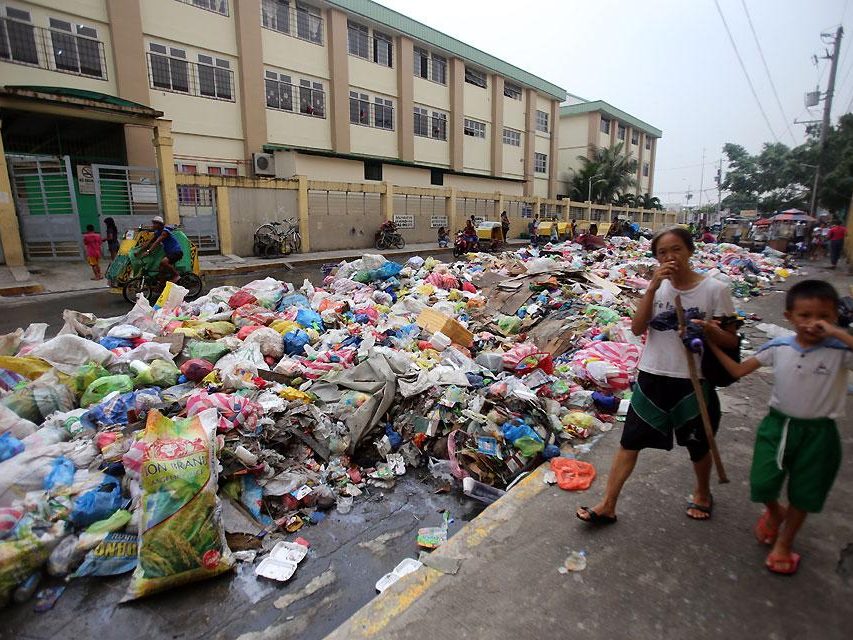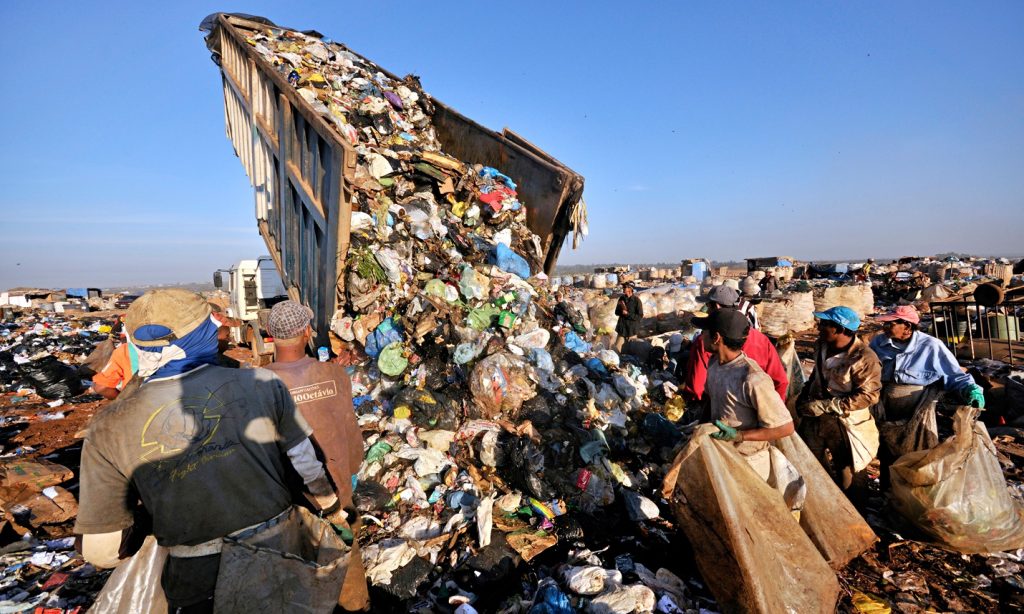The informal sector is a significant part of the economies of many countries in the Global South. According to the International Labour Organization (ILO), over 60% of the world’s employed population works in the informal sector, with the majority being in developing countries. These workers operate outside of formal employment relationships and without social protection or benefits, which makes them more vulnerable to exploitation and poverty. As urbanization accelerates across the Global South, how national, provincial, and municipal governments manage this rapid growth in consumption and waste will largely determine their ability to build climate-resilient cities. In this article, we look at the informal waste workers in the Global South along with challenges and opportunities to drive growth and sustainable development in current and emerging megacities.
The Size of the Informal Sector
The size of the informal sector varies across countries and regions. In sub-Saharan Africa, the informal sector accounts for up to 90% of non-agricultural employment, while Latin America and the Caribbean represent around 50% of total employment. In South Asia, informal employment accounts for 85% of all employment, while in East Asia and the Pacific, it is around 60%. The informal sector includes a range of occupations, from street vendors, domestic workers, and construction workers to waste pickers and recyclers.
Informal Sector and Waste Management
One of the informal sector’s most significant and overlooked parts is the informal waste sector. Waste pickers and recyclers are crucial in managing municipal solid waste in many countries. They collect, sort, and sell recyclables, reducing the amount of waste that ends up in landfills or is burned, contributing to air pollution. The ILO estimates that there are around 15 million waste pickers globally, with the majority being in Asia, Africa, and Latin America.
According to the Women in Informal Employment: Globalizing and Organizing: WIEGO, informal waste collection, and recycling are typically categorized into the following activities:
- Doorstep/household waste pickers
- Inherent waste buyers moving around the streets buying or (bartering for) clean reusable recycling materials
- Street waste picking
- En route/ truck waste pickers (municipal collection crew of informal)
- Waste picking from dumps or landfills
For many of these workers, modes of transport can vary across markets. Core transportation platforms include
- Foot
- Pushcart
- Horsecart
- Pick-up Truck
- Cycle
- Tricycle
- Rickshaw
Despite their vital role, waste pickers and recyclers are often stigmatized and excluded from formal waste management systems. They work in unsafe and unhealthy conditions, with limited access to protective equipment, training, and financial resources. They are also often subject to harassment and exploitation by middlemen who purchase their materials at low prices. In many cases, local governments do not recognize or value their work, which leads to a lack of investment in infrastructure and policies to support them.

Technology & The Informal Sector
However, there are opportunities for improving the situation of informal waste workers. One way is using technologies such as mobile applications and digital platforms that connect waste pickers and recyclers with formal waste management systems, enabling them to access better prices for their materials and improve their working conditions. For example, the Waste4Change app in Indonesia connects waste pickers with households and businesses, allowing them to collect and sort recyclable waste and earn income. Another example is the Cataki app in Brazil. It connects waste pickers with businesses and individuals who want to recycle their waste creating income for microhaulers while promoting recycling and sustainability. Brazil produces approximately 80 million tons of waste daily, with only 2% recycled. Its recent national solid waste plan calls for a 50% recycling rate within the next 20 years – a long road ahead.
The use of technologies can also drive inclusiveness in the informal sector more broadly. Mobile phones, for example, have become ubiquitous in many developing countries and can be used to access financial services, training, and market information, which can help improve informal workers’ livelihoods. Digital platforms also provide a way for informal workers to access new markets and customers, enabling them to increase their incomes and expand their businesses.
Web3 & Blockchain
Blockchain technology can potentially transform many industries, including the informal sector, by providing secure and decentralized systems for financial transactions, record-keeping, and trust-building. The informal sector, which includes unregistered small businesses and self-employed workers, is a major contributor to the economies of many countries, particularly in Asia, Africa, and Latin America. In low and middle-income countries, their contribution to GDP is estimated at 35% versus 15% in advanced economies. However, informal sector workers often face challenges in accessing financial services and establishing trust with customers and partners. Web3 and blockchain can address these challenges and create new economic growth and development opportunities.
One of the most promising applications of blockchain technology in the informal sector is for peer-to-peer (P2P) transactions. With blockchain, individuals can exchange goods and services without the need for intermediaries such as banks or payment processors. This can reduce transaction costs, increase transparency, and improve financial inclusion. For example, in Indonesia, a startup called Tokocrypto uses blockchain to enable P2P transactions for informal sector workers, including farmers and small traders. The platform allows users to buy and sell cryptocurrencies and exchange them for fiat currency without needing a bank account.
Another opportunity for blockchain in the informal sector is for the supply chain management. Blockchain can provide a secure and transparent record of transactions and movements of goods, which can help to reduce fraud, increase efficiency, and improve trust among supply chain participants. For example, the BitPesa platform in Kenya uses blockchain to enable cross-border payments and supply chain financing for small businesses. BitPesa allows users to send and receive payments in multiple currencies and provides financing based on the value of their supply chain transactions.
Blockchain can also be used for identity management, which is a critical issue for informal sector workers who often lack formal identification documents. By creating a secure and decentralized identity system, blockchain can establish trust and enable access to financial services and other opportunities. For example, in Brazil, the MeuID platform is using blockchain to create a digital identity system that can be used for a range of services, including banking, healthcare, and e-commerce.
Finally, blockchain can be used for crowdfunding, enabling informal sector workers to access capital for business development and growth. Crowdfunding platforms based on the blockchain can provide a secure and transparent way for investors to support small businesses and entrepreneurs while reducing the risks of fraud and mismanagement. For example, the Airtm platform in Mexico uses blockchain to enable crowdfunding for informal sector workers, including artisans, farmers, and street vendors. Airtm allows users to create profiles, submit project proposals, and receive funding from investors worldwide.
Strengthening Inclusiveness
The timing of blockchain adoption as a solution remains unclear. Until such time, challenges to promoting inclusiveness in the informal sector remain. One challenge is the lack of data and information on informal workers, which makes it difficult to design effective policies and programs. Another challenge is the resistance of some formal businesses and governments to recognize and support informal workers, which can lead to conflict and competition. These concerns reflect the complexity of stakeholder ecosystems present in many megacities and the constant competition for economic resources. Building inclusive stakeholder models will be necessary; otherwise, the economic upside for many of these workers remains capped.
In addition to technology, there are other ways to promote inclusiveness in the informal sector. One way is through providing social protection and benefits, such as healthcare, pensions, and maternity leave, which can help reduce the vulnerability of informal workers and improve their well-being. Healthcare remains a core challenge for workers in the sectors. Many of the healthcare conditions include communicable diseases and musculoskeletal, respiratory, and waterborne diseases. Another way is through the recognition and formalization of informal work, which can provide informal workers with legal rights and protections and enable them to access credit, training, and other resources. Columbia has led the way in recognition of the importance of waste workers within the community. In 2013 the Association of Waste Pickers of Bogota won several legal cases with the Constitutional Court of Columbia ruling in favor of the organization supporting recognition and remuneration for collection, transport, and public recycling services.
Final Thoughts: Moving the Needle
In conclusion, cities remain key stakeholders in the fight against climate change, given the relationships between urbanization, natural resource consumption, and biodiversity destruction. More importantly, the fight against climate change cannot be won unless urban stakeholders and ecosystems are included. The informal sector sits at the Base of the Pyramid with substantial but often unrecognized contributions to resilient communities. Technology, e.g., circular economy/waste apps and blockchain, offers opportunities to consolidate, formalize and integrate the informal waste sector. However, the technologies themselves remain piecemeal, with more integration into the broader community and stakeholder ecosystems needed. Deeper integration provides for more robust income models for the informal sector. It also moves the needle on solutions and outcomes required to build more climate-resilient communities by 2050 and beyond.
